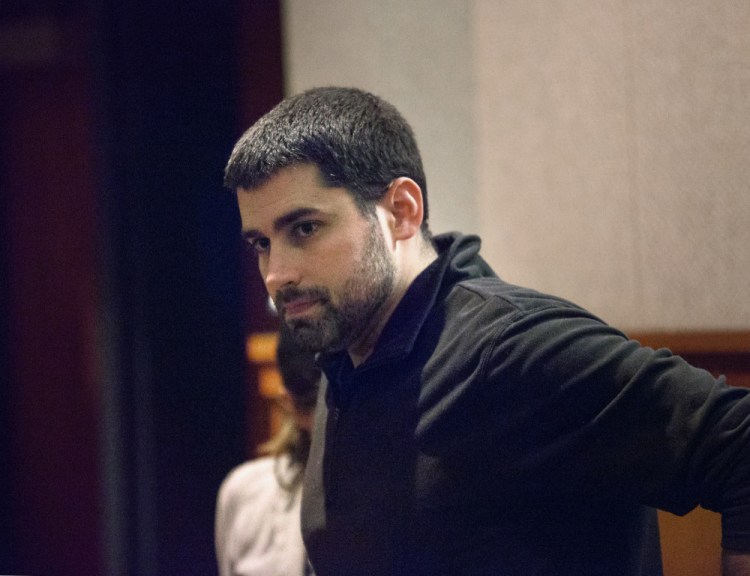Lawyers made their first arguments Friday in an unprecedented case in Maine that pits the free speech rights of a loud anti-abortion protester against the rights of women to receive health care in a facility free of excessive noise from outside.
An attorney for the protester, Brian Ingalls of Lisbon, sought at Friday’s hearing in the Cumberland County Courthouse in Portland to have the lawsuit dismissed before any evidence is presented, on grounds that Ingalls’ right to preach under federal law outweighs the rights of women under state law to safe and effective health care.
The Maine Attorney General’s Office filed the lawsuit last November seeking to enforce a section of state law for the first time to ban Ingalls, 26, from coming within 50 feet of Planned Parenthood’s facility at 443 Congress St. in Portland.
The lawsuit accuses Ingalls of violating the Maine Civil Rights Act by yelling so loudly about murdering babies, aborted babies’ blood and Jesus on Oct. 23 that his voice could be heard in the second-floor counseling and examination rooms of the facility. He continued yelling after being told by a police officer to quiet down, the lawsuit says.
Ingalls’ attorney, Stephen Whiting, said the intention of the law, which prohibits someone from continuing to make noise outside facilities such as Planned Parenthood after being told to stop by police, was never intended to apply to free speech.
“I helped craft that statute,” Whiting said. “We crafted that language as a noise statute. By noise, we meant air horns, sirens, whistles – things of that nature. We never dreamed it would be applied to street preaching or other speech activity.”
Justice Lance Walker, however, said he would judge the case based on the written word of the law, not on the discussions of intent by lawyers at the State House in Augusta before lawmakers approved it.
Assistant Attorney General Leanne Robbin said that before bringing this lawsuit against Ingalls, her office had brought 10 previous lawsuits seeking to protect the rights of anti-abortion protesters.
“Brian Ingalls has a right to street preaching,” Robbin said. “It’s the street screeching that the state is taking issue on.”
Walker made no ruling after the half-hour hearing on Whiting’s motion to dismiss the case. The judge questioned Whiting’s arguments more times than Robbin’s during the hearing, but made no indication of how he may rule.
“The nub of the argument is that what the state has alleged technically meets the wording of the (state) statute, but … ” Whiting began in one exchange before the judge interjected.
“And if that’s so, don’t you lose?” Walker asked.
“No, because if applying this statute would violate Mr. Ingalls’ First Amendment rights, it doesn’t state a claim,” Whiting said.
Whiting argued that the U.S. Supreme Court has ruled to limit only speech that is “loud and raucous,” such as a chanting crowd, in circumstances like those in Ingalls’ case.
“You can’t apply the statute to override someone’s First Amendment rights,” Whiting said.
“You can in certain places, certain times and certain manners. That’s what we’re really talking about, isn’t it?” Walker countered.
Robbin argued the state has one video as evidence showing Ingalls yelling at someone in the window of the second floor of Planned Parenthood, addressing the person directly, showing he had an intention to disrupt the health care consultation inside.
“When he disturbs the medical care, that’s when he goes over the line,” Robbin said.
Robbin said that anti-abortion protesters had been gathering for many months outside Planned Parenthood without any legal violation before Ingalls began protesting there, too.
“We are not targeting Mr. Ingalls because of what he is saying. We’re targeting Mr. Ingalls because of how loud he is saying it and because of the impact he is having on the counselor who is trying to provide patients with important information about the procedures that they are going to undergo, the releases they need to sign and the decisions they need to make about their healthcare,” she said.
Ingalls sat silently in the spectator section of the courtroom with his family during the hearing. He declined to comment on the case before leaving.
Ingalls’ pastor at his church, Cell 53 in Lewiston, has filed a related federal lawsuit against Attorney General Janet Mills and Portland police, accusing them of targeting his anti-abortion protest in front of Planned Parenthood in violation of the First Amendment. Ingalls is listed as an elder at the church on its website and he indicates on his Facebook page that he works there.
Pastor Andrew March claims in the federal lawsuit filed last December that other activities in Monument Square, such as parades, are louder than protests, but that police told him to lower his voice because of the content of what he was saying.
Whiting represents March in that case and has a pending motion that has yet to be heard in U.S. District Court in Portland, asking for an injunction order from the court to prevent the police and Attorney General’s Office from quieting anti-abortion protests.
Send questions/comments to the editors.



Comments are no longer available on this story